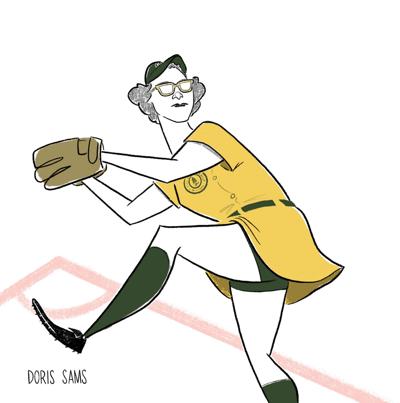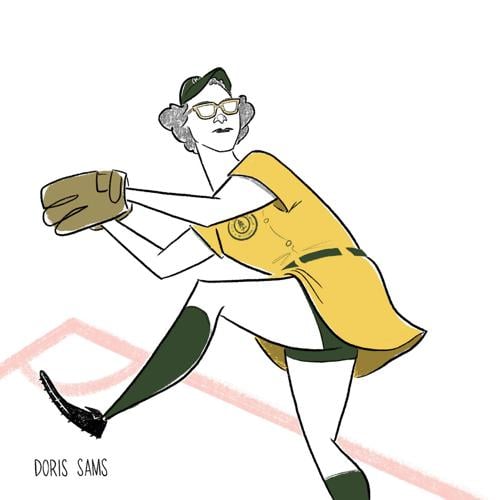With runners on first and third base, the New York Yankees’ “Sultan of Swat” emerged from the dugout. Four-thousand fans, packed into sunny Engel Park for the 1931 spring exhibition, roared in anticipation as Babe Ruth tipped his cap to the replacement pitcher and stepped to the plate, eager to give the good people of Chattanooga, Tenn., a show.
The first pitch was called a ball. Then came a strike. Then another. Painting the outside corner, the next pitch brought forth a big, empty swing — and The Babe struck out. “Iron Horse” Lou Gehrig came right behind him, and in unexpectedly short order, one-third of the six-man batting lineup known as “Murderers’ Row” would be retired — by a woman.
Sports pages all over the country buzzed about the “Girl Pitcher,” 17-year-old Memphis native Jackie Mitchell, on her first professional outing with the all-male Chattanooga Lookouts. But few took the hardworking prodigy seriously. Despite skeptical, paternalistic coverage, Mitchell’s debut wounded the pride of the Yankees, prompting Ruth to scoff, “I don’t know what’s going to happen if they begin to let women in baseball. … They are too delicate. It would kill them to play ball every day.”
The truth is, women have coached, managed, umpired, scouted and played baseball for as long as the sport has existed. Some of the best and most compelling, like Jackie Mitchell, played right here in Tennessee.
For never having a major league team, Tennessee has some great baseball cities and teams — a good reminder that Major League Baseball will never be the only game, or even the best game, in town — and a rich baseball history, composed mostly of legends, heroes and misfits banished from baseball’s white male institutions.
The greatest example is the Negro Southern League, a semi-pro funnel for the Negro Major Leagues — the constellation of professional Black baseball teams in the 1920s through 1960s, born from brilliance and resilience that racial segregation could not extinguish. Five Tennessee cities had teams in the league, where Hall of Famers like Satchel Paige, Willie Mays and Nashville’s Norman “Turkey” Stearnes kicked off their storied careers. The Southern League was also the first in the system to sign women — at least three players and a coach — to its men’s teams, starting with pitcher Georgia Mae Williams for the Chattanooga Choo-Choos in 1945. Four years later, the incredible Toni Stone would play four seasons in the Southern League before signing on to become the first woman in the Negro Major Leagues. Little is known about Williams and the women of the Southern League, but recollections from Stone and other women of the Negro Leagues assure us their experiences were not easy and were often lonely. At the height of their playing years, a professional women’s league was formed — the first and (still) only of its kind. But exacting “beauty standards,” intended to exclude anyone who wasn’t white, for the All-American Girls Professional Baseball League denied Black and brown women the opportunity to play — and thus denied itself of their contributions.
Popularly known as the inspiration behind Penny Marshall’s 1992 film A League of Their Own (and now a series with the same name on Amazon Prime), the AAGPBL was created in 1943 to boost recreation and morale during World War II. Of the hundreds who tried out that year, only 60 athletes made the inaugural cut. Five of them (plus two team chaperones from Nashville) were Tennesseans, including infielder Mary Louise Lester, outfielder Lillian “Bird Dog” Jackson and catcher Irene “Choo-Choo” Hickson, the oldest to sign on at 27. Before her impressive nine-year baseball career as “Choo-Choo,” Hickson was known by most as “Tuffy,” the only woman boxer in Chattanooga.
Four more Tennesseans would later play in the league. In eight seasons, two-time MVP Doris “Sammy” Sams of Knoxville earned a season batting title and a home run title, and thrice made the All-Star team — as an outfielder and a pitcher. She’s also one of two pitchers in the league to throw a perfect game. (The other, Jean Faut, is the only professional pitcher in history to throw two.)
Despite having to play in lipstick and skirts — bare lips on the field warranted a fine, but bare legs on packed gravel were no problem — the 600 women of the league played legit, pro-level hardball in 12 exciting seasons. Their experiences and paychecks afforded them access to education and careers other women of their generation did not have. They also had something crucial that other women playing baseball did not: each other.
For Jackie Mitchell, the women of the Negro Leagues and nearly every woman since, the dream of baseball was and is a lonely pursuit. Those who persevere are inevitably met with a level of backlash for proving themselves worthy of a spot in the “male domain.” Their significant “firsts” are rarely followed by seconds or thirds.
It’s hard to maintain a blazed trail without resources or opportunities — particularly when every resource is dedicated to funneling girls away from baseball and toward softball. But baseball and softball are not the same sport. Girls who want and deserve to play baseball must often give it up for the sport that will allow them time off the bench and a shot at college. Even Mo’ne Davis — according to sports journalist Mark Hyman, Philadelphia’s “most talked about player on earth,” who pitched a two-hit, eight-strikeout, complete-game shutout over South Nashville in the 2014 Little League World Series — sat on the bench her one year of varsity baseball and had to recalibrate to softball.
Every so often, the predictable gatekeepers of American baseball history will rise up from their armchairs to question the legitimacy of the Negro Leagues or the validity of women like Jackie Mitchell and Toni Stone — a ceremonial seventh-inning stretch to assert the “integrity” of their domain.
But if baseball is truly our national pastime, it only stands to reason that more than a small percentage of athletes should have the opportunity to play — for as long and as high as their joy and dedication will take them. Tennessee seems like a good place to do it.






